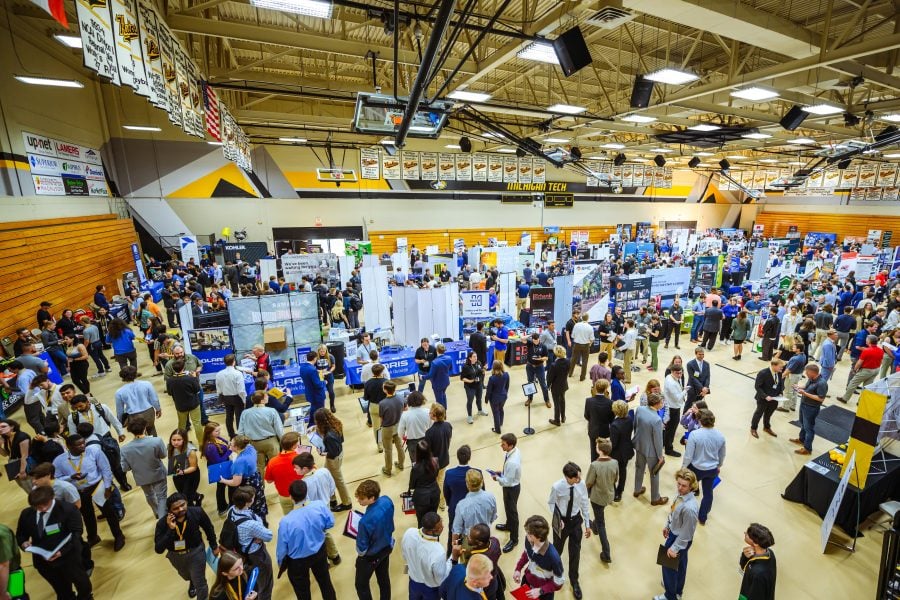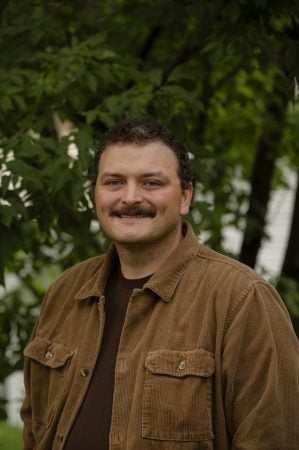
As Huskies gear up for Michigan Technological University’s Fall Career Fair on Tuesday, Sept. 23, they’re looking for on-point advice to land co-ops, internships, and full-time jobs.
Cody Woodbury ’20 has got them covered. Woodbury is a process engineer at Koppers, a global leader in the development of progressive wood treatment technologies. He’s one of the many Michigan Tech students who did a co-op with the company and went on to be hired full-time.
In this Q&A, the chemical engineering grad shares practical advice for students on topics like why it’s important to ask prospective employers questions, how to understand what success looks like during a co-op, and how to make the most of your time at Tech.
Q: What led you to the wood technology career path while you were at Tech?
CW: Having a co-op opportunity really shaped my career direction. I always knew engineering was something I wanted to do, but my co-op experience led me to wood treatment, which I hadn’t considered early on as a student. Working in a chemical facility and gaining hands-on experience piqued my interest.
I really liked seeing firsthand what chemical engineers do and learning about all the different unit operations and chemical aspects needed to create our product. Getting a practical view of what I was going to school for helped me better realize my interests. My co-op experience also showed me what to expect of a company that cares about and prioritizes its employees, which ultimately drove me to pursue my career at Koppers.
Q: What foundational knowledge and skills are most important for a student interested in wood technology?
CW: Having a traditional engineering foundation and knowledge, such as being able to calculate mass and energy balances, is, of course, key. But just as important is having an open mind, asking questions, and always being willing to learn. You don’t have to know everything to be valuable, but you should be curious. It is imperative to see things from a different perspective and have the courage to speak up about it. A lot of engineering is learning as you go, problem-solving, and asking the right questions.
Q: How did your co-op at Koppers prepare you for a career in this field?
CW: My co-op showed me what to expect from a company. Koppers raised the bar on providing hands-on support, as well as opportunities for engaging work and community impact. It gave me a practical view of what I was going to school for and helped me understand what I was really interested in. And I learned that success isn’t linear; sometimes you make mistakes and face challenges before completing your project or meeting your goals.
Q: Can you share a practical example of something you learned during your co-op?
CW: At the start, I was working on a project and didn’t fully understand the equipment needed. I reached out to an instrumentation and electrical engineer to learn what it was, what it did, and why it was necessary.
By leveraging my curiosity and eagerness to learn, I was able to ask the right questions, make a new connection, and fully understand a new project and process. Situations like this are a prime example of how success can come in many shapes and forms. While I didn’t get an A+ for the project, since it wasn’t graded, I learned how to hone a skill that I’ve applied throughout my career.
Q: Were there any other lessons you took away from your co-op that you wouldn’t have learned in the classroom?
CW: One thing I quickly realized is that success isn’t always about getting a perfect score. In the real world, success can look very different. It might mean finding a way to make operations run more smoothly, improving safety for your team, or simply seeing a project through from start to finish. Learning how to value these different forms of success is so important because it helps you appreciate your growth in ways that lead to real-world impact.

“There are many things you pick up outside the classroom that you just can’t learn from a textbook. For example, communicating with vendors, navigating unexpected challenges, and learning how to ask the right questions are all skills that come from real, hands-on experience. Those moments teach you to adapt, think on your feet, and see the bigger picture, which are just as valuable as anything you’ll learn in a lecture hall.” – Cody Woodbury ’20, BS Chemical Engineering
Q: What should students look for in a company when considering co-op and post-graduation careers?
CW: Company culture is huge. Find a company that values its employees and community. Transparency, strong communication, and a drive for innovation are all important. Companies like Koppers stand out by providing engaging positions, real-world projects, and a supportive culture. Being able to work on functional projects that have a real impact is something I really appreciate and has gone a long way in molding my educational and career experiences.
Q: What keeps you excited about your work?
CW: Wood technology is compelling to me because it allows you to learn new things, solve interesting problems, and help make things that people use every day. Wood treatment means putting special chemicals or coatings on wood to help protect it from bugs, water, and rotting. Treated wood lasts longer, reduces maintenance costs, and conserves resources, so people don’t have to fix or replace things like playgrounds, fences, decks, utility poles, and other infrastructure. I’m passionate about the impact my work has on the people in both my community and at Koppers. Continuous improvement in safety, efficiency, and innovation means we’re always making a positive difference for those around us.
Q: What advice do you have for Huskies just beginning their journey at Michigan Tech?
CW: I cannot reinforce enough how valuable it is to be curious and ask questions. When you’re starting out, it’s easy to feel like you should have all the answers, but the truth is, nobody expects you to know everything right away. In fact, some of the best learning happens when you simply admit you don’t know something and seek out learning more.
Don’t be afraid to dig deeper and ask “why” or “how.” The more questions you ask, the more you’ll learn—not just about your field, but about how to tackle complex problems in general. Being curious opens doors to new opportunities, ideas, and people that you can connect with and grow from. So, give yourself permission to learn, to experiment, and to keep challenging what you know. That’s how you’ll really expand your knowledge and make the most of your hands-on learning experiences.
Q: Any other advice to Huskies about making the most of their time at Tech?
CW: Work hard on your schoolwork and projects but make time to try new things and explore the area. Houghton is a beautiful place, and the Upper Peninsula is incredible! Go see the waterfalls, hike, bike, camp, and try skiing. Don’t focus so much on a high GPA that you miss out on the broader college experience.
Being a well-rounded individual with great social and communication skills is equally important and will serve you well in your career.
About the College of Engineering
Michigan Tech’s College of Engineering offers more than 15 bachelor of science degrees in biomedical engineering, chemical engineering, civil, environmental and geospatial engineering, electrical and computer engineering, engineering fundamentals, geological and mining engineering and sciences, manufacturing and mechanical engineering and technology, materials science and engineering, and mechanical and aerospace engineering.
Our engineering graduate degree options include master’s and PhD programs, along with robust online certificate programs for busy professionals. Follow Michigan Tech Engineering on Facebook, Instagram, LinkedIn, and Twitter for the latest happenings.